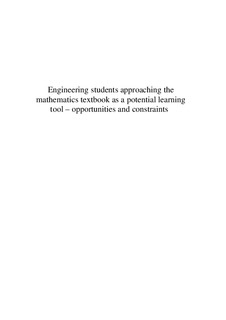Engineering students approaching the mathematics textbook as a potential learning tool – opportunities and constraints
Doctoral thesis
Permanent lenke
http://hdl.handle.net/11250/2378867Utgivelsesdato
2016Metadata
Vis full innførselSamlinger
- Doctoral Dissertations [376]
Sammendrag
It is usually assumed that the students at tertiary level work intensively
and individually with the new mathematical concepts (Wood, 2001). In
this context the mathematics textbook might be an important learning
tool. This thesis addresses the issue of what factors might influence the
role of the mathematics textbook as a learning tool. The study is situated
in the context of the basic mathematics course taken by first-year engineering
students. A brief pilot study indicated that a majority of the students
preferred using lecture notes rather than the textbook although in
the beginning of the semester they perceived the textbook as being important
when learning mathematics. This was the starting point of this
research that aims to identify and explore the factors that might influence
the role of the textbook proposed to first-year engineering students. The
textbook is conceptualized as a cognitive learning tool embedded in the
educational setting offering the basic mathematics course. The study was
conducted when the students worked with the derivative concept. The
process of students’ approaching the textbook is viewed from an epistemological,
a cognitive and a didactical perspective. The study is an exploratory
case study, and a qualitative research strategy within an interpretative
paradigm was chosen. Data was gathered from a number of
vantage points: students’ responses to a questionnaire, observations of
lectures and task solving sessions, interviews with the teacher and the
students, and informal talks with the teacher and the students. Additionally
a questionnaire was sent to authors of the most used calculus textbooks
with the aim of exploring their vision concerning their mathematics
texts. The results of the main study confirm the observed phenomena
from the pilot study. Students perceived the textbook as difficult and the
lecture notes were preferred when working with the derivative concept.
The textbook was used by the students mainly to read the examples and
figure out possible procedures when working with the tasks. The findings
of the study reveal possible opportunities and constraining factors of
epistemological, cognitive and didactical nature. Students’ poor previous
knowledge, their approach to learning mathematics, the cognitive demands
of the textbook, and the way the textbook was used during the
lectures seem to influence the role of the textbook as a learning tool.
Possibilities and limitations were discussed within the given theoretical
framework.
This study suggests that higher awareness about the assumed and real
role of the mathematics textbooks at tertiary level is necessary. Some
suggestions for further research that might provide deeper insights about
the issue are given.
Beskrivelse
Doktorgradsavhandling

